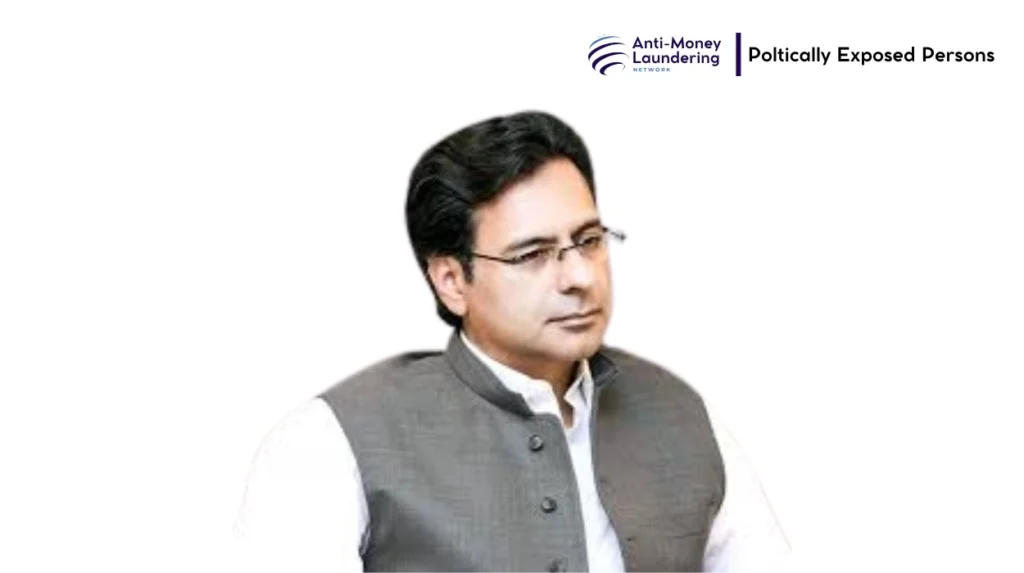Moonis Elahi is a prominent Pakistani politician widely recognized for his influential role in the country’s political landscape. As a senior figure, he has been associated with multiple political offices and holds a significant presence, both regionally in Punjab and nationally in Pakistan. His career has been marked by both public achievements and controversies, including allegations of financial misconduct. This profile explores his life, personal background, career accomplishments, wealth, and critical issues concerning financial transparency faced by Moonis Elahi as a politically exposed person (PEP).
Early Life and Background
Born on April 12, 1976, in Lahore, Pakistan, Moonis Elahi comes from a well-established political family. He holds Pakistani nationality and citizenship, reflecting his deep roots in his home country. Moonis Elahi’s place of birth in Lahore situates him in one of Pakistan’s major cultural and political centers. He pursued higher education abroad, earning a Bachelor of Business Administration (BBA) degree in 1999 from the University of Pennsylvania, Philadelphia, USA. This international academic exposure has contributed to his professional and political outlook.
Personal Life
Moonis Elahi family is steeped in politics; he is the elder son of Chaudhry Pervaiz Elahi, a former Chief Minister of Punjab, and enjoys familial connections crucial to his political ascendancy. His brother, often referred to as moonis elahi brother, is also actively involved in politics, creating a strong political lineage. Regarding his personal relationships, Moonis Elahi spouse and moonis elahi wife refer to the same individual, a supportive partner playing a background role in his public life. Though details about Moonis Elahi children are less publicized, the family maintains a high-profile presence within political and social circles. His religion is Islam, reflecting the majority faith of Pakistan.
Career and Achievements
Moonis Elahi position in Pakistan’s political sphere includes former Minister for Water Resources, a role he held from July 2021 to April 2022. He has served as a member of the National Assembly representing constituency NA-69 (Gujrat-II) under the Pakistan Muslim League-Quaid (PML-Q) and later joined Pakistan Tehreek-e-Insaf (PTI) in 2023 amid political realignments. His contributions to provincial development, notably the elevation of Gujrat from district to division status, demonstrate his local influence. He is known for championing the controversial Kalabagh Dam project, embodying his commitment to national development issues.
His political journey also includes contesting various elections, with a mix of victories and defeats, illustrating the dynamic and competitive nature of Pakistani politics. His advocacy on environmental topics and infrastructure projects marks his efforts as a public servant influenced by his academic and regional background. Despite political turbulence, ch moonis elahi remains a key figure in Punjab politics and national governance.
Lifestyle, Wealth, and Assets
Moonis Elahi net worth is a topic intertwined with public speculation and scrutiny. As a member of a wealthy and prominent political family, his lifestyle reflects affluence typically associated with his class. Details emerging from investigative journalism and leaks suggest ownership or links to significant properties and offshore companies, though exact figures remain contested. Public interest often focuses on his real estate holdings, luxury assets, and alleged offshore accounts, although much of this remains under legal and political dispute. The blend of political power and perceived wealth highlights the blurred lines frequently seen among Pakistani elite families.
Influence, Legacy, and Global Recognition
Moonis Elahi country Pakistan has witnessed his rise as a political heir to a known dynasty, and his influence extends across Punjab and national policy circles. His legacy is shaped by both notable achievements in infrastructure and environmental advocacy and shadowed by allegations of financial misconduct. International recognition, though limited in a formal diplomatic sense, stems from press and watchdog groups highlighting his role in Pakistani politics and issues tied to governance and corruption. His legacy is complex, representing both opportunity within a political system and challenges posed by nepotism and lack of transparency.
Financial Transparency and Global Accountability
As a classic example of a politically exposed person, Moonis Elahi faces intense scrutiny regarding his financial dealings. Transparency advocates and law enforcement agencies have highlighted his case amid broader concerns about elite impunity in Pakistan. Allegations linked to offshore companies, money laundering, and failure to disclose assets serve as a critical lens on governance challenges. Despite ongoing investigations, court cases, and declared proclamations, Moonis Elahi current status involves legal battles and absconding claims, reflecting systemic issues where political influence can hinder accountability.
This situation underscores difficulties faced by regulatory bodies fighting corruption, exposing vulnerabilities in Pakistan’s legal and financial systems. Calls for reform demand stronger enforcement, closing loopholes used by figures like Moonis Elahi to maintain ill-gotten wealth. Globally, such cases feed into narratives about the need for international cooperation to clamp down on illicit financial flows involving politically exposed persons.
The story of Moonis Elahi is emblematic of Pakistan’s political tapestry, combining inherited power, public service, and contentious financial affairs. From his early life in Lahore to his education abroad and political career, he has navigated complex terrains shaped by family legacy and political realignments. His personal and professional trajectories intersect with broader national challenges—including governance transparency, elite wealth, and legal accountability.
While his achievements in political office and regional development are notable, the allegations of financial misconduct and ongoing legal issues temper his public image. This profile reflects a multifaceted figure whose impact on Pakistan’s political system is significant but controversial, underscoring critical lessons in the necessity of transparency, rule of law, and political reform in emerging democracies.

